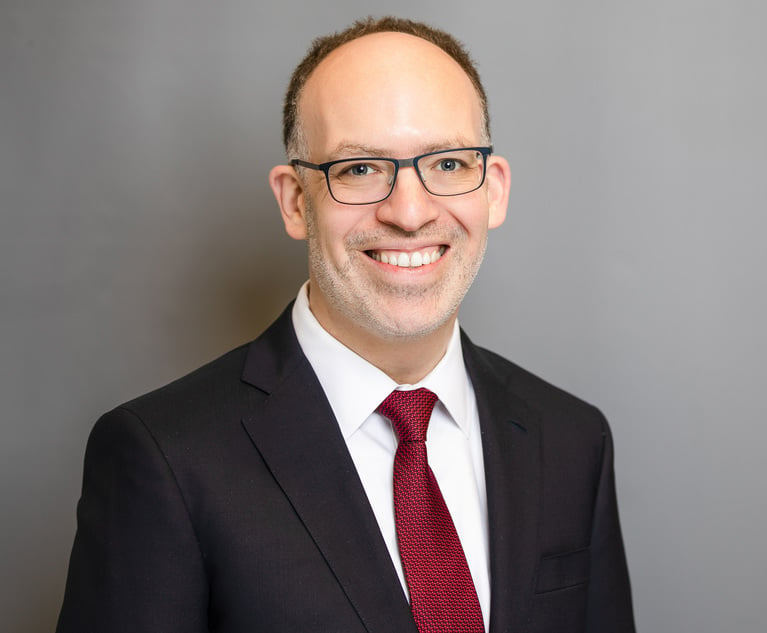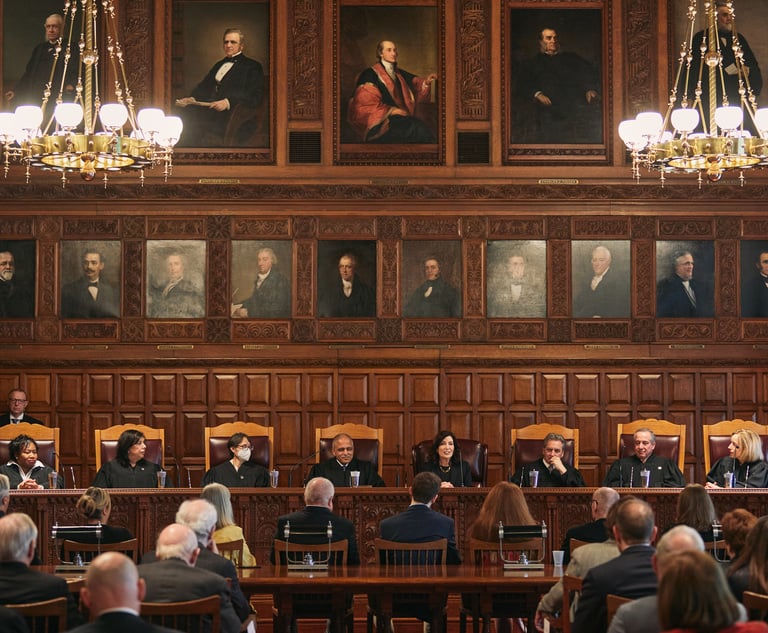When the Government Speaks, Does the First Amendment Matter?
Is the First Amendment applicable to speech by the government, and most especially to a president's speech?
February 11, 2021 at 10:38 AM
5 minute read
 Much, maybe too much, has been written about whether Donald Trump's insurrectionary speech on January 6 is protected by the First Amendment. Commentators have cited Justice Oliver Wendell Holmes's famous aphorism in Schenck v. United States that "the most stringent protection of free speech would not protect a man in falsely shouting fire in a theater and causing a panic." Also prominently cited is the Supreme Court's modern test for unprotected incitements set out in Brandenburg v. Ohio: "[A]dvocacy [that] is directed to inciting or producing imminent lawless action and is likely to incite or produce such action."
Much, maybe too much, has been written about whether Donald Trump's insurrectionary speech on January 6 is protected by the First Amendment. Commentators have cited Justice Oliver Wendell Holmes's famous aphorism in Schenck v. United States that "the most stringent protection of free speech would not protect a man in falsely shouting fire in a theater and causing a panic." Also prominently cited is the Supreme Court's modern test for unprotected incitements set out in Brandenburg v. Ohio: "[A]dvocacy [that] is directed to inciting or producing imminent lawless action and is likely to incite or produce such action."
But the discussion assumes that the First Amendment gives Donald Trump constitutional protection for his speech, regardless of the content or circumstances of his speech. Does it? Is the First Amendment applicable to speech by the government, and most especially to a president's speech?
The Framers of our Constitution enacted the First Amendment not to protect the government; they enacted the First Amendment to protect the governed, to prevent government from "abridging the freedom of speech, or of the press; or the right of the people peaceably to assemble, and to petition the Government for a redress of grievances." In enacting the Bill of Rights, the Framers sought to protect the citizens of America from abuses by the government, whether those abuses involved repression of religious liberty, arbitrary invasions of privacy, denial of fair criminal proceedings, infliction of cruel punishments, and, of course, the untrammeled freedom to communicate. The Framers enacted these rights to protect the people, not the government.
This content has been archived. It is available through our partners, LexisNexis® and Bloomberg Law.
To view this content, please continue to their sites.
Not a Lexis Subscriber?
Subscribe Now
Not a Bloomberg Law Subscriber?
Subscribe Now
NOT FOR REPRINT
© 2025 ALM Global, LLC, All Rights Reserved. Request academic re-use from www.copyright.com. All other uses, submit a request to asset-and-logo-licensing@alm.com. For more information visit Asset & Logo Licensing.
You Might Like
View All

The Power of Student Prior Knowledge in Legal Education
Trending Stories
- 1'It's Not Going to Be Pretty': PayPal, Capital One Face Novel Class Actions Over 'Poaching' Commissions Owed Influencers
- 211th Circuit Rejects Trump's Emergency Request as DOJ Prepares to Release Special Counsel's Final Report
- 3Supreme Court Takes Up Challenge to ACA Task Force
- 4'Tragedy of Unspeakable Proportions:' Could Edison, DWP, Face Lawsuits Over LA Wildfires?
- 5Meta Pulls Plug on DEI Programs
Who Got The Work
Michael G. Bongiorno, Andrew Scott Dulberg and Elizabeth E. Driscoll from Wilmer Cutler Pickering Hale and Dorr have stepped in to represent Symbotic Inc., an A.I.-enabled technology platform that focuses on increasing supply chain efficiency, and other defendants in a pending shareholder derivative lawsuit. The case, filed Oct. 2 in Massachusetts District Court by the Brown Law Firm on behalf of Stephen Austen, accuses certain officers and directors of misleading investors in regard to Symbotic's potential for margin growth by failing to disclose that the company was not equipped to timely deploy its systems or manage expenses through project delays. The case, assigned to U.S. District Judge Nathaniel M. Gorton, is 1:24-cv-12522, Austen v. Cohen et al.
Who Got The Work
Edmund Polubinski and Marie Killmond of Davis Polk & Wardwell have entered appearances for data platform software development company MongoDB and other defendants in a pending shareholder derivative lawsuit. The action, filed Oct. 7 in New York Southern District Court by the Brown Law Firm, accuses the company's directors and/or officers of falsely expressing confidence in the company’s restructuring of its sales incentive plan and downplaying the severity of decreases in its upfront commitments. The case is 1:24-cv-07594, Roy v. Ittycheria et al.
Who Got The Work
Amy O. Bruchs and Kurt F. Ellison of Michael Best & Friedrich have entered appearances for Epic Systems Corp. in a pending employment discrimination lawsuit. The suit was filed Sept. 7 in Wisconsin Western District Court by Levine Eisberner LLC and Siri & Glimstad on behalf of a project manager who claims that he was wrongfully terminated after applying for a religious exemption to the defendant's COVID-19 vaccine mandate. The case, assigned to U.S. Magistrate Judge Anita Marie Boor, is 3:24-cv-00630, Secker, Nathan v. Epic Systems Corporation.
Who Got The Work
David X. Sullivan, Thomas J. Finn and Gregory A. Hall from McCarter & English have entered appearances for Sunrun Installation Services in a pending civil rights lawsuit. The complaint was filed Sept. 4 in Connecticut District Court by attorney Robert M. Berke on behalf of former employee George Edward Steins, who was arrested and charged with employing an unregistered home improvement salesperson. The complaint alleges that had Sunrun informed the Connecticut Department of Consumer Protection that the plaintiff's employment had ended in 2017 and that he no longer held Sunrun's home improvement contractor license, he would not have been hit with charges, which were dismissed in May 2024. The case, assigned to U.S. District Judge Jeffrey A. Meyer, is 3:24-cv-01423, Steins v. Sunrun, Inc. et al.
Who Got The Work
Greenberg Traurig shareholder Joshua L. Raskin has entered an appearance for boohoo.com UK Ltd. in a pending patent infringement lawsuit. The suit, filed Sept. 3 in Texas Eastern District Court by Rozier Hardt McDonough on behalf of Alto Dynamics, asserts five patents related to an online shopping platform. The case, assigned to U.S. District Judge Rodney Gilstrap, is 2:24-cv-00719, Alto Dynamics, LLC v. boohoo.com UK Limited.
Featured Firms
Law Offices of Gary Martin Hays & Associates, P.C.
(470) 294-1674
Law Offices of Mark E. Salomone
(857) 444-6468
Smith & Hassler
(713) 739-1250








